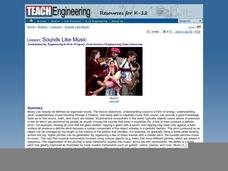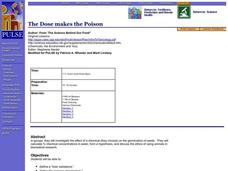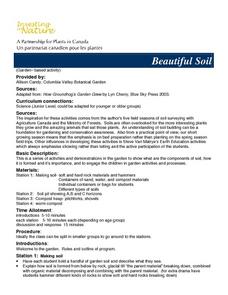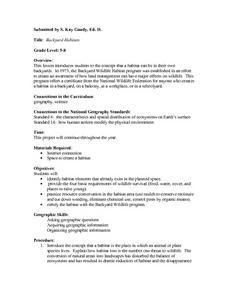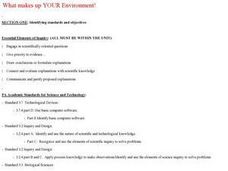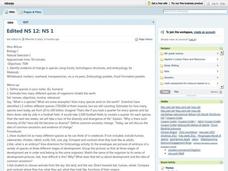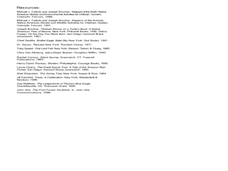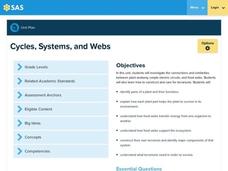Curated OER
Sounds Like Music
Students define and examine the connections between sound and music and how engineers design instruments. They listen to examples of musical instruments, view a demonstration of a tuning fork and bottles filled with varying amounts of...
Curated OER
Radiation and Color
Tenth graders explore the relationship between color and heat absorption by measuring the temperature change of water in differently colored test tubes as they are exposed to a heat lamp. They work in small groups to collect data and...
Curated OER
Changing With the Tide
Students describe three different aspects or life forms of the salt marsh. They compare and contrast the low and high marsh. Students explain what happens in different areas of the marsh at low and high tide; and explain the roles...
Curated OER
Ocean Habitats
Students examine the water samples from a demonstration and discuss the difference between fresh and salt water. They draw different animals that live near or in the ocean and how humans can harm the ocean habitat. They draw pictures of...
Curated OER
Plants, Animals and Our Environment
Students draw and label the basic needs of animals. They draw and label the basic needs of plants. Students understand the basic needs of plants and animals are not only the same, but are interrelated. They know that the environment...
Curated OER
The Dose makes the Poison
Students investigate the effect of a chemical (they choose) on the germination of seeds. They calculate % chemical concentrations in water, form a hypothesis, and discuss the ethics of using animals in biomedical research.
Curated OER
Beautiful Soil
Students discover what are the components of soil. They examine how it is formed and it's importance. They engage in garden activities and processes. They hold a handful of garden soil and describe what they see. They take a...
Curated OER
Using Abiotic and Biotic Parameters to Monitor Air Quality
Students identify the abiotic factors that influence a river or stream and the organisms that live in it. They measure several abiotic and biotic parameters to gauge water quality. Students examine the biotic environment by identifying...
Curated OER
Are Viruses Alive: Sample Socratic Questions
Students comprehend the definition and uniqueness of life and its complexities. They examine what characteristics constitute a living organism. Students recognize the extent of the role viruses play in the movement and molding of life as...
Curated OER
Backyard Habitats
Students identify habitat elements. They create a habitat in a backyard, on a balcony, at a workplace, or in a schoolyard and provide the four basic requirements of wildlife survival (food, water, cover, and places to raise young). They...
Curated OER
What makes up YOUR Environment!
Students create their own land or water environment. They make their environment livable for all the different animals they collect to put in it. Students research the types of animals that they can have in their environment, and how...
Curated OER
Natural Selection
Students estimate how many different species of organisms inhabit the Earth. In groups, they match the pictures of embryos at the different stages of development. They compare and contrast animals from the sky, land, and water and...
Curated OER
Topography of Africa
Young scholars study Africa's diverse landscape and investigate how these features impact the available water supply, food sources, and population distribution of the continent. They compare topographical features and
their affect on...
Curated OER
Arthropods
In this arthropods learning exercise, students will identify 3 different arthropods and compare these organisms' breathing structures: gills, book lungs, and tracheal tubes. This learning exercise has 3 fill in the blank and 6 short...
Curated OER
Types of Rock
In this rocks worksheet, students compare and contrast the 3 types of rocks: sedimentary, igneous, and metamorphic. Students complete 1 graphic organizer.
Curated OER
How Pollution Disrupts Our Natural Environment
Students conduct experiments to illustrate global warming. In this air pollution lesson, students first examine how a layer of greenhouse gasses might impact the earth's atmospheric temperature, then evaluate how the layer of gasses...
Curated OER
Those Amazing Earthworms- A Worm's World
Young scholars investigate earthworms. In this organisms lesson, students observe earthworms in their environment and record their behavior towards light and how they eat. Young scholars continue on a month long observation.
Curated OER
Red Tail Ridge Wetland Study Project
Fifth graders use a real life scenario of the wetlands to gather information on creatures of the habitat. For this wetlands lesson, 5th graders research the interdependence of organisms in a healthy habitat. Students collected samples...
Curated OER
Animals of the Fire Ice
Students examine ocean life by identifying methane hydrates. In this ocean life lesson, students research organisms that live in the coldest, deepest parts of the ocean and live off methane hydrates. Students create a group...
Curated OER
Forestry: merit badge
In this forestry worksheet, students answer short answer questions about forestry, economy, water, air, and more. Students complete 7 questions and fill out sample charts to get their merit badge.
Curated OER
Vermicomposting
Second graders create an eco-bin and study the habitat of the worm in soil. In this vermicomposting lesson, 2nd graders observe the effects of water ( too much or too little) and other factors on the eco-bin.
Pennsylvania Department of Education
Cycles, Systems, and Webs
Fourth graders review the parts of the plant and their functions. In this plant lesson plan, 4th graders recognize that plants must transfer energy to make food. Students understand the interdependence of organisms in an ecosystem.
Curated OER
Growing plants
Learners explore plants and recognize that they are living things that require light and water to grow; students identify, name and match the parts of plants.
Curated OER
Wales: An Interdisciplinary Unit
Students practice basic map and geographic skills as they compare Oregon to Wales. Students color map of Wales and Oregon using color codes to distinguish between land, water, and bordering nations or states, listen to stories and...


